Pirates, gentrification, and the future of living aboard on Puget Sound
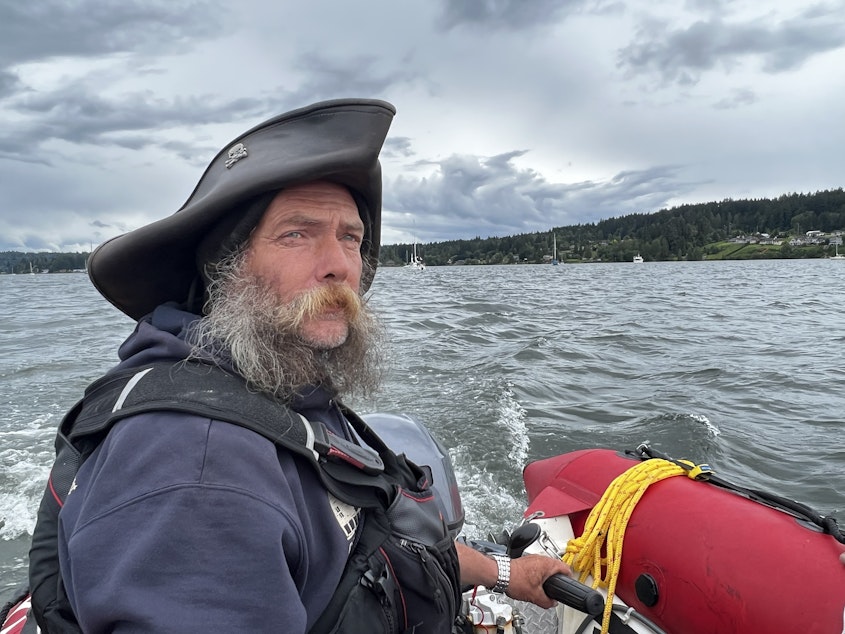
On a the perfect day in Washington, you can see Puget Sound filled with boats — yachts, sailboats, and decades old vessels alongside shiny new cruisers.
While many local sailors are hobbyists, a lot of them live on their boats. And as prices rise across the region, there's a wave of new mariners looking to find affordable housing options on the water.
But life on the Salish Sea is arduous, and not completely free of the problems we run into on land.
In Liberty Bay, just outside Poulsbo, sits a constellation of sailboats. While most might strike passersby as typical Puget Sound anchorage, a handful of masts don skulls and crossbones, a recognizable symbol for pirates.
"Most people go with the Hollywood idea of pirates," says Thomas Gregory, known by some as Sir Thomas the Pirate King, captain of a black sailboat named the Lord Nelson.
But Sir Thomas the Pirate works fine by him, too.
"Frankly, pirates aren't a good thing. They still exist. They're still committing crimes on the water," he said. "Not that that's what's going on around here."
A group of sailors, including Gregory, is gathered around a long wooden table in the hold of an old Canadian navy vessel called The Badger. Also on The Badger are the ship's captain, who goes by Douglass Fir, Garth "Crusher" Levin, and Andy Woodford.
Sponsored
Each of these sailors come from different backgrounds, from welding to the mortgage business to wildland firefighting, but they've all gathered here for two reasons: a love of the open water and the rising cost of living on land, which they say is forcing more and more boaters into life on the water.
"What it's evolved to for a lot of people out here is living off the grid, and staying away from the system in general, and living a free life," Gregory says.
Gregory is the longest tenured of the group, living on the water for the last 10 years. That experience is one of the reasons some give him the title of "Pirate King," but it's also because he is a mentor for what is a growing fleet of new pirates like Levin and Woodford, who've only been on the water for the last year.
Gregory also runs his own nonprofit called Salish Sea Rescue, assisting in emergencies across Puget Sound.
"As long as you have a boat, you're willing to work on it and you're willing to learn, you don't have to be a good mariner. You just have to be willing to learn," Gregory says.
Sponsored
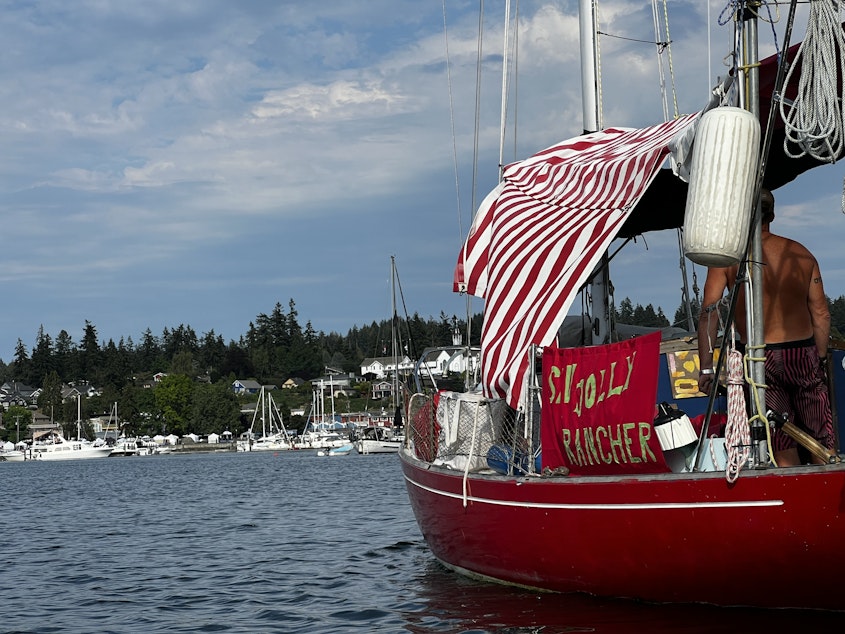
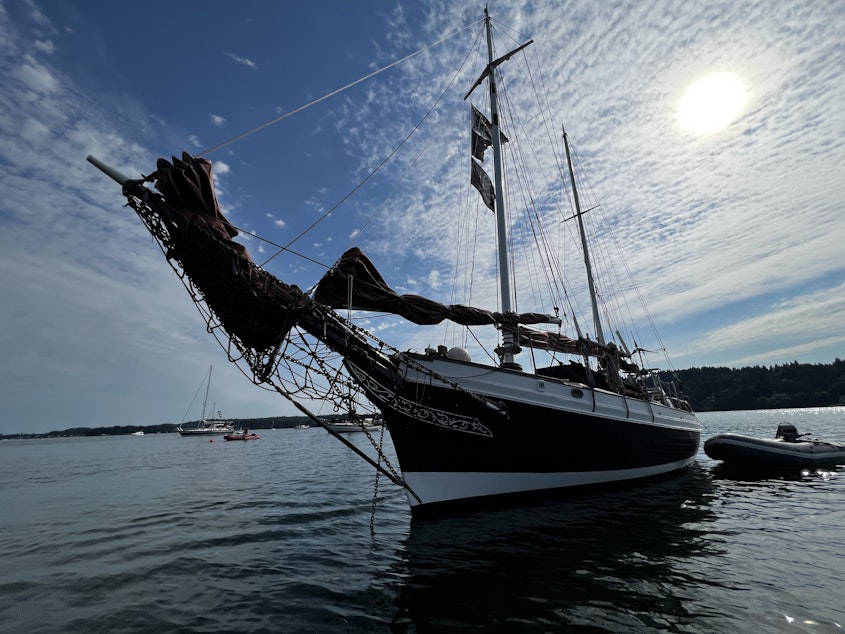
That mentorship is becoming increasingly important. As towns across the region deal with rising rents and prices, there are more people turning to life on a boat as an affordable alternative.
"More and more boats that people can't afford the moorage for are being anchored out," said Thomas Rose, one of three Port Commissioners for the Port of Poulsbo. "And we've seen a two to three times increase in the last 14 months of that."
The rise in "offshore anchorage" — which includes but is not limited to people living aboard boats — coincides with a rise in derelict vessels.
Sponsored
These boats are old, barely operable, and are often left to rot and sink in the water. That's when derelict vessels become problem children for marinas. A single boat can cause thousands of dollars in damage if it leaks sewage or chemicals into the water, and even more if it sinks. If the boat isn't insured, those costs fall on the port.
As a result, marinas like the Port of Poulsbo have instituted more rigorous inspection policies and insurance requirements. It's a difficult balance to allow access to the services and safety of the port, while also supporting new boaters on vessels that might be a greater liability.
"We have others living on a boat that they maybe acquired cheaply through Craigslist, or for nothing at all," Rose says. "That qualifies as their home. It's a difficult thing to a judge as to what to do as far as the regulation."
Even as sailors living on the water have helped (literally) on-board new offshore liveaboards, to their benefit and the port's, the relationship there isn't always harmonious. The liveaboards are adamant believers in the independence of their lifestyle, and that attitude can grate against the rules and regulations the port has to follow.
"They've kind of abused the system. They might come in on their boats and tie up in the wrong spot. They might leave something that's inappropriate vessel-wise," Rose says. "So sometimes that gets a little wearing on staff."
Sponsored
From the sailors' perspective, the new requirements from the port to ward off derelict vessels are affecting their ability to use the marina, too. While their vessels are older and rougher around the edges than many of the new fiberglass boats, Gregory says they're well maintained.
The liveaboards argue that changes in the marina are also coinciding with what seems like more hostility from those on land.
"People on land have always complained," Gregory says. "'Oh, there's a boat anchored in the water in front of my multimillion-dollar house.'"
As Andy Woodford recalls it, there was a time — about 20 years ago — when liveaboards who moved around were admired for their rebellious lifestyle.
"I remember the harbor masters going, 'That's a real sailor there, that guy's salty as hell.' And now they're 'trash,'" Woodford says.
Sponsored
The liveaboards have a long list of complaints, from claims that locals call in erroneous oil spills to get liveaboard ships moved, to accusations the port is purposefully trying to push them out of Liberty Bay in favor of newer, trendier boats. They say this is reflected in the new marina requirements, alongside increases in prices.
"I've lived here 20 years — I can't afford to rent in the town anymore," Woodford says, calling his predicament a form of gentrification. "So if I want to stay, it's on the boat or I have to move. They just don't have much use for blue-collar people."
In response, Rose said he has heard complaints levied against offshore boats from locals in Poulsbo, but was adamant there is no bias or discrimination coming from port staff toward pirates specifically.
"I'll say that some of the personnel situations and processes ha ve not necessarily been perfect, and the relationships haven't gelled," Rose says. "But I have not heard anything in particular from [Sir Thomas] or others that —frankly — I haven't attended to in commission meetings or privately."
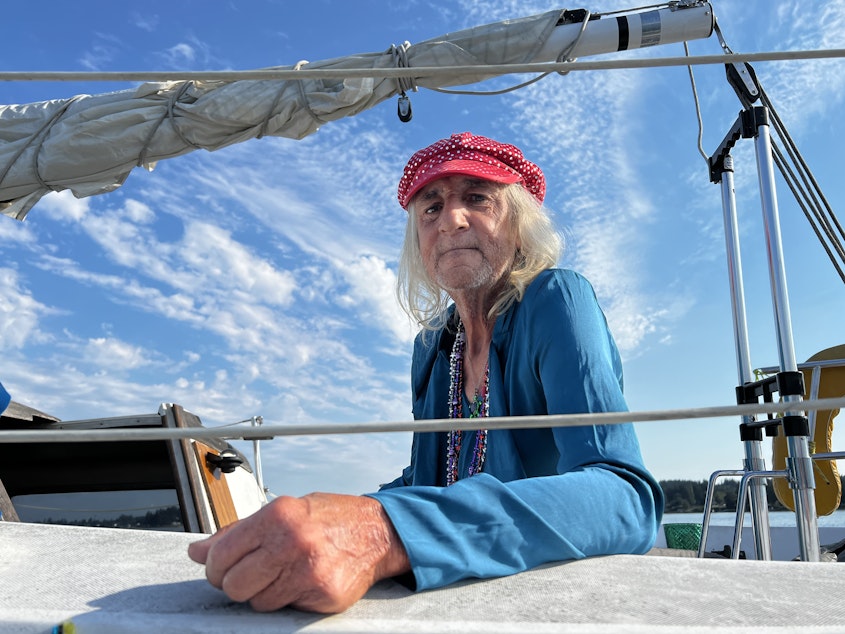
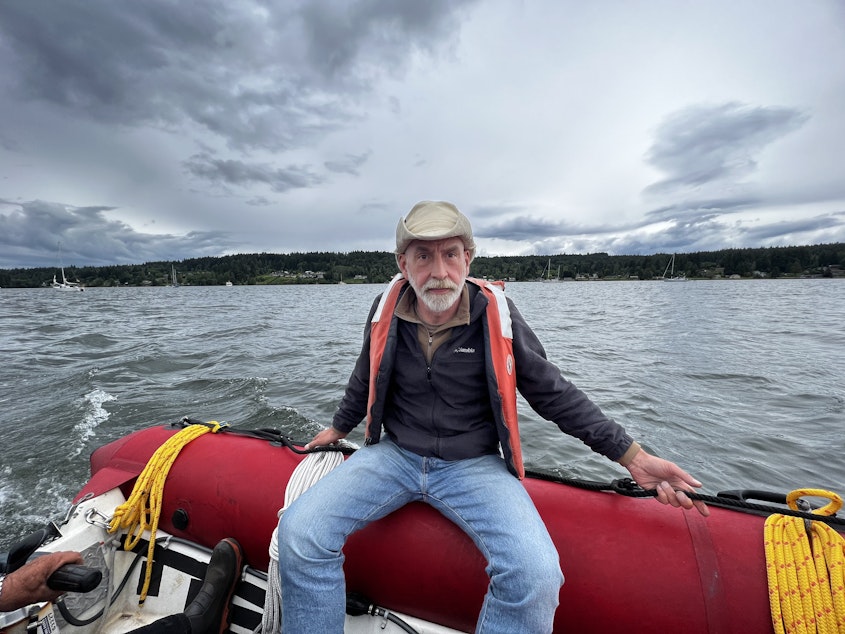
One silver lining in the relationship is the annual Pirate Bash, taking place in August, which brings locals and liveaboards from the area together for a weekend of music and pirate-themed festivities. The bash provides a snapshot for what the future of this brand of "pirate" might look like: they enjoy the pier, while the port enjoys the business.
The bash also highlights the variety of those who call themselves "pirates." Some on their boats enjoy the annual celebration, dressing up and firing off vintage canons. But not all of them live full-time on their boats, like Gregory. And others feel trepidation about flying their pirate flags these days.
"It's for the fact that you're looked down upon," says Galen Gibson. "Most of the boats you see are pirate guys in here, but they won't admit it. They won't fly a flag for that reason."
Gibson says they understand how there might be backlash against so-called pirates — their freedom-loving lifestyle can turn some into troublemakers. But at the same time, there are people like Gibson, who are older and living on social security, who won't be able to keep up with rising insurance and slip prices.
Living as a "pirate" has never been easy. You're at the mercy of the waves and the weather. All the self-dubbed pirates are self-starters, taking Gregory's lead and teaching others the ropes. But it's a scary idea to many that even this lifestyle, with its thrift and independence, might be priced out of a rapidly changing region.
"This is a rich man's game now," Gibson says. "And you can't just get a boat and go out and enjoy yourself anymore. It's a dying community here."
Listen to the full story by clicking the audio above.





